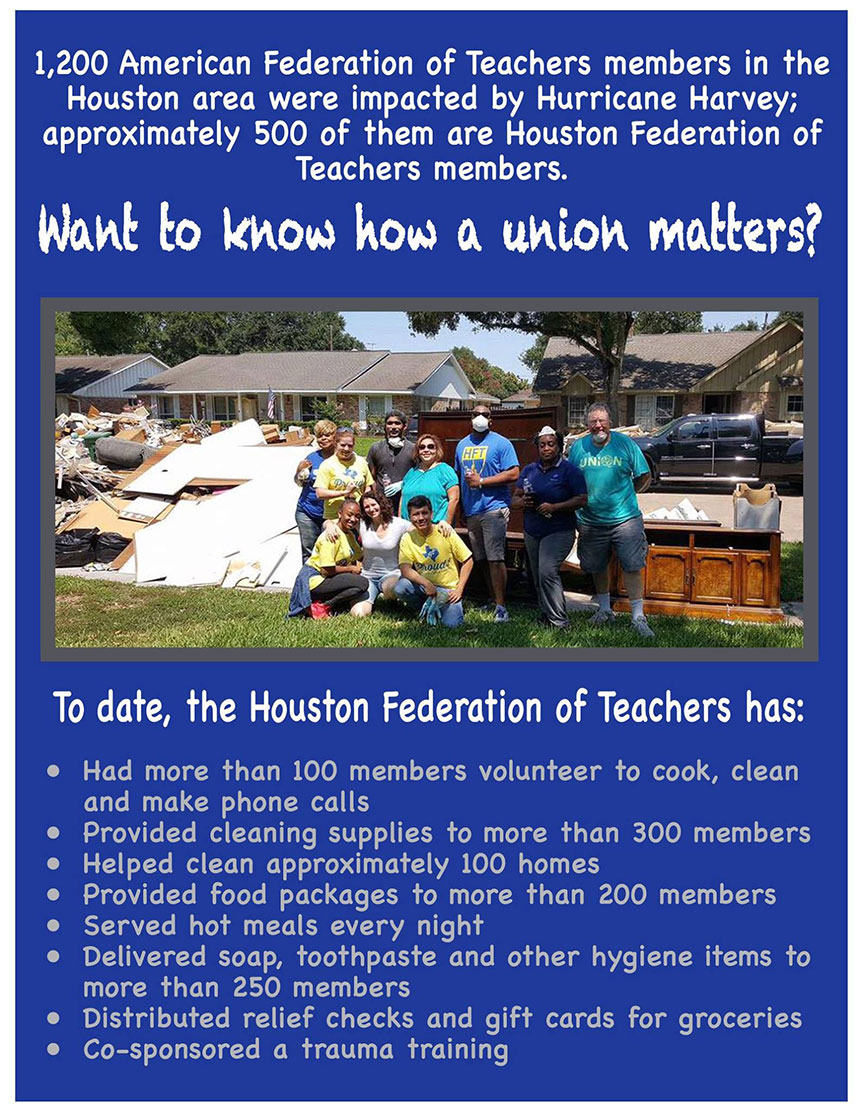Zeph Capo, president of the Houston Federation of Teachers, was teaching back in his home city of Miami when Hurricane Andrew hit in 1992. It was a Category 5 hurricane that destroyed or damaged three-quarters of a million homes — including much of Capo’s own Florida home.
“For three weeks, you could walk through the walls of the house,” he recently recalled. “I lived through the aftermath. Luckily, this time my home was fine and I could concentrate all my time and attention on our members,” he said.
“This time” was Hurricane Harvey that struck Houston and surrounding areas in August, destroying homes, businesses and, yes, schools.
“This has been like a flashback from Hurricane Andrew,” he said
Capo (pictured) said about 1,200 American Federation of Teachers members in the area have been impacted; approximately 500 of them are HFT members. They are ripping out water-soaked and wind-ravaged debris, furniture, walls and rugs to rehab their homes. Others have had to face a total loss.
How the union has helped
Capo is in his third year as union president of the massive local, so it’s been a trial-by-water for him. He stepped out quickly.
The HFT contacted 4,500 of its 6,000 members within the first 48 hours after the hurricane through the text messaging system Hustle, Capo said. “We were giving them a try, using them for organizing purposes. Then they gave us access to the system for hurricane response and emergency rescue contacts free of charge.”
The HFT has been following up those messages to gauge the assistance needed by our members. “We have been providing cleaning supplies, both hot and non-perishable food, assisting with home cleanups, identifying new housing,” Capo said. The union will also pitch in to assist with school supplies and books to our students and our teachers in the hardest hit areas.
NYSUT members have generously contributed more than $50,000 to victims of Hurricanes Harvey and Irma — which hit Florida and other parts of the southeast last week — through its Disaster Relief Fund.
“Thank you to all the NYSUT members who have donated. Please let them know it means so very much to our members,” said Capo, who is an AFT vice president.
Many NYSUT members know what this kind of upheaval and turmoil are like after surviving Hurricane Sandy, Tropical Storm Irene and Tropical Storm Lee. There are also nearly 16,000 NYSUT retirees living in Florida. Contributions are still being accepted to the NYSUT fund for the Florida victims of Hurricane Irma.
The AFL-CIO has sent in relief cleaning teams, joining the HFT member-to-member cleanup.
“We’ve been working as a larger union family,” Capo said.
The AFT is also assisting with a First Book partnership to get supplies to teachers hardest hit. Donations are being accepted by the Houston school district; the community is stepping up to help. Capo said the Barbara Bush Literacy Foundation has joined the First Book partnership to provide school supplies and books.
“Several of our members and students are still in shelters. Students and their families have been displaced to Austin, Dallas and San Antonio,” Capo reported last week. “We hope they are able to return home, but the reality is they may start over in their new cities. Our city and our district are actively assisting families in order to return some sense of normalcy to Houston.
Last week, about 200 schools reopened in Houston, and another 80 are still under repair. However, at least 10 of those buildings will not reopen this year and, Capo said, a few of those will likely never reopen.
He praised the custodial staff and facilities/maintenance workers who have been working “night and day” to get the buildings reopened.
Schools help return a sense of normalcy and routine to students whose lives have been uprooted. They are also a haven for students who are living with strangers in shelters, or with other family members and friends, often in crowded conditions.
